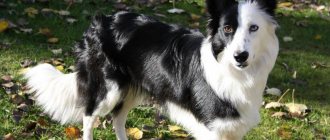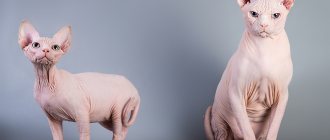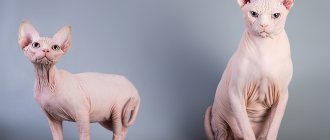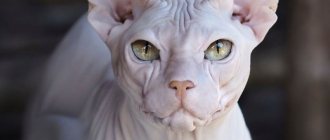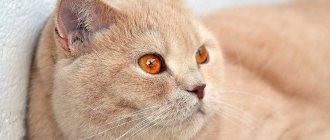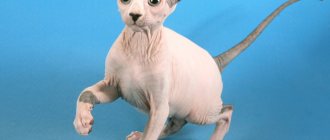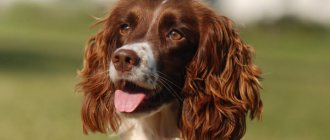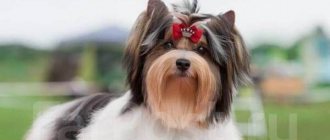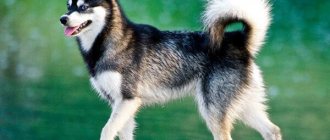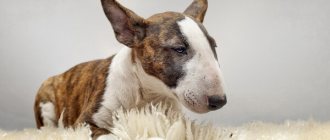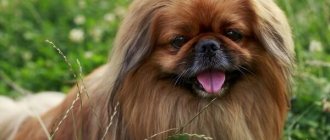Canadian Sphynx cats are one of the most unusual cats in the world. They leave no one indifferent. This is a very young breed that is rapidly gaining popularity.
For some, their appearance causes rejection. Damn, gremlin, rat, bald freak, bat - this is not a complete list of epithets that are awarded to hairless cats. Others admire their unusual beauty, considering them the ideal cat.
So, the Canadian Sphynx: the characteristics of the breed are still poorly known to a wide range of people in our country. Sphynxes are confused with Peterbalds and Don Hairless cats and are considered difficult to keep and capricious.
This is largely due to the fact that Sphynx nurseries appeared in Russia only in the late 1990s. These cats still remain rare and exotic. But I will say one thing: once you stroke the velvety, hot body of the sphinx, you are already at risk. You risk falling in love with this breed.
However, in this article I will try to give an objective description of Canadians, and not sing their praises. Sphynx dogs are not for everyone. You can’t get such a cat just by being seduced by their unearthly appearance and lack of fur. You should study the character of the Canadian sphinxes and the nuances of their content, and only then make a decision.
Author of the article: Olga Shiltsova, practicing veterinarian, author of the books “Dachshund of Fate” and “Tails of Fortune”
Description of the Canadian Sphynx breed
Popularity 84th place among 87 cat breeds
Lifespan:
14-16 years old
Height:
25-30 cm
Country of origin:
Canada
Average price:
8-15 thousand rubles
Weight:
3.5-7 kg
Latest articles Cat health
Ataxia in cats: what it is, how it manifests itself and is treated 01/23/2022 151 0 0
Cat health
Leukemia, or viral leukemia in cats 01/23/2022 140 0 0
Key facts
The official name of the breed is Sphynx, but in Russia it is called Canadian, referring to its country of origin. This is used to distinguish the breed from other hairless cats: the Don and St. Petersburg Sphynxes.
These cats are characterized by sexual dimorphism. In the picture with different-sex animals, it is easy to understand which of them is a boy and which is a girl. The description of the Canadian Sphynx breed states that the maximum weight of a female is 4 kg, and the weight of a male is 7 kg. The height at the withers should be no more than 30 cm. The average life expectancy of the Canadian Sphynx is 15 years.
The price for show-class representatives with a rare color and prestigious pedigree often reaches 150 thousand rubles. By letting your pet go for an independent walk outside the home, you are taking a risk. It stands out well among other animals, so it can become a victim of thieves.
The main characteristic of the Canadian Sphynx is the absence of the usual coat. This phenomenon is explained by a genetic mutation that arose without human intervention.
Due to increased appetite and omnivorousness, the animal quickly turns into a bald “barrel”. To maintain good physical shape, you need to constantly monitor the amount of food you eat and maintain activity.
Also, the disadvantages of the Sphynx cat include vulnerability to drafts and the scorching sun. Future owners will have to stock up on knitted sweaters and sunscreen.
After meeting the sphinx, it is difficult to remain indifferent. They adore human company and have a hard time enduring hours of loneliness. If you have a dog or other animal, then the “Canadian” will become an excellent friend. The more animals you have in your family, the easier it is for your cat to tolerate separation from its beloved owner.
Characteristics of Canadians
It is worth listening to reviews from owners about the character of Canadian breed cats. As a rule, they sing long praises to their pets, but, to the animals’ credit, the odes of praise are fully deserved.
The character of these cats is similar to other four-legged animals - dogs. Cats are easy to train, as they are quite intelligent and can learn to fetch small objects and perform various tricks such as opening windows and doors.
They begin the training process by training them to use the tray and responding to their name. A kitten of this breed remembers all this almost the first time.
Sphinxes are very socialized, so they prefer to communicate with their owner, to whom they are infinitely loyal. The cat and the owner can watch TV together for a long time, and then also go for a walk around the apartment together.
The sphinx reacts calmly to other animals; the hunter's skill is fast asleep in him.
History of the origin of the Canadian Sphynx
Images of cats without fur are found in chronicles found in excavations of ancient civilizations. For a long time, such animals were considered a natural anomaly and were discarded from breeding. The situation changed in the 1960s.
The hairless kitten was discovered in Canada, the recognized country of origin of the breed. He was born by an ordinary short-haired cat. The owner named the baby Prune and crossed him with his mother when he grew up. The mating was successful, and the woman received another offspring with hairless kittens. After 10 years, breeding along this line was interrupted. The American state of Minnesota took over the baton.
The ancestors of the modern Sphynx cat were two cats from the small town of Baden. During breeding work, they were crossed with other breeds, but without interrupting the line. Curly Devon Rexes and other hairless cats found in Canada were used for breeding.
Among the interesting facts associated with the breed, it is worth noting the history of the origin of its name. For a long time, the Sphynx was called the “Canadian hairless cat,” but breeders wanted to secure a more original name. The choice fell on the Egyptian Sphinx - the main attraction of the pyramid complex in Giza.
Until 1986, felinologists had a negative attitude towards the gene responsible for the coat mutation. After numerous studies, the theory of possible genetic diseases was refuted. The first international organization to recognize the Canadian Sphynx was TICA. Other organizations introduced a description of the new breed a little later. The CCA developed the standard in 1992, and the CFA only in 2002.
Types of Sphynx cats
The Sphynx breed is represented by three species. In addition to the Canadian one, there is also the Don variety, which was bred in Rostov-on-Don, and the Peterbald - the creation of breeders from St. Petersburg.
The Canadian Sphynx is smaller than the Don Sphynx. The standard for this breed was approved in 1992. The Peterbald was obtained by crossing the Don variety with Oriental cats about 20 years ago.
What does the Canadian Sphynx look like?
The general impression made by the sphinxes is deceptive. The illusory weightlessness created by the absence of fur collapses the moment the animal is picked up. A tightly built body is covered in muscles, and muscles are always heavier than fat. Therefore, in the photo, the Canadian Sphynx may seem deceptively fragile.
Muzzle
What does a Canadian Sfinsky look like from different angles? The breed is characterized by a wedge-shaped head. Its width is slightly shorter than its length. The short muzzle is covered with pronounced folds. On well-developed whisker pads, the vibrissae are absent or grow to a short length. The Sphinx has high cheekbones and a strong chin. The transition from a flat forehead to a short nose is weakly expressed.
Huge ears with a wide base are the hallmark of the breed. There is a slight difference in the TICA and CFA standards that determine what the Sphynx looks like. The first organization allows a small amount of hair on the outside of the ears, and the second considers it a breed defect. Fur inside the ears is unacceptable under both standards.
The shape of the large and slightly slanted eyes resembles a lemon. They are widened towards the center and narrowed at the edges. The color of the iris should be in harmony with the color of the coat.
Body type
The head is located on a slightly arched neck of medium length. The body of the Sphinx is heavy and muscular. The muscles of cats are more developed than those of cats. The areas of the croup, abdomen and chest are rounded. The belly resembles a barrel, so it seems that the cat has recently eaten. There should be no fat deposits.
The hind limbs are longer than the front limbs, so the line of the back behind the shoulder blades is raised. The paws have an oval shape and thick pads with long and graceful toes. The fingers are well developed, so cats can open doors or take small objects into them. The animal's tail resembles a rat's. It is long and flexible, and its tapered tip allows for a small amount of hair.
Coat and color
Cats have thick and folded skin. The greatest number of folds is found on the limbs and muzzle. Instead of the classic guard hair and undercoat, soft and short fluff grows on the body. Its length does not exceed 2 mm. The tail, scrotum, outer side of the ears and the interdigital space are covered with short and sparse hair.
The coat feels like suede or velor to the touch. Hairlessness is only visible, so the standard allows any colors of the Canadian Sphynx, except shaded and zonal: smoky, chinchilla, cameo and others. Also, shorn animals are not allowed to participate in the exhibition.
Varieties of the Canadian Sphynx are the St. Petersburg and Don Sphynxes. Recently, in some countries they are considered separate breeds.
Sphynx cat: pros and cons
A hairless cat has many advantages, but there are also some disadvantages:
| pros | Minuses |
| Lack of fur | Need for careful care |
| Friendly disposition | Strong dependence on a person |
| High intelligence | Need for clothing (additional expenses) |
| Indiscriminate eating | High feed consumption |
| Good health | |
| A cat's ability to get along with other animals | |
| Underdeveloped hunting instinct | |
| Various color palette |
Owners of Sphynx cats speak of them with love and tenderness. They are often compared to dogs, because hairless pets follow their owner's heels and constantly climb into their arms.
A gentle and friendly creature with a non-standard appearance is ideal for both a lonely elderly person and families with small children.
The character of the Canadian Sphynx
The Arabs called the Egyptian sphinx the Father of Terror, but the Canadian cat took only the name from the ancient sculpture. Unlike a lion with a human head, bald animals are kindness itself. The devoted nature of the Canadian Sphynx is reminiscent of a dog.
Sphinxes have an intolerant attitude towards loneliness. They become attached not to a place, but to a person. The owner's long absence makes them depressed. These animals have a hard time with family changes, so weigh the pros and cons before getting a kitten.
At home, “Canadians” do not leave their owner’s side and love to lie in his arms. These cats are friendly and highly active. They quickly find contact with children of any age. A small child will be safe with this mischievous pet, since aggression is alien to the cat. If you are often absent from work, then find company for the sphinx. They get along well with other animals and do not have hunting habits. Any pet is suitable as a playmate: another cat, dog, bird or rodent.
The breed is characterized by high intelligence, so buy some interactive toys and try training. Sphinxes are open to communication, so they are not afraid of large crowds of strangers.
Thanks to their equanimity, they give good results at exhibitions, and some representatives managed to appear in the world of show business. The role of the balding Persian cat, the favorite pet of Dr. Evil from the movie "Austin Powers", was played by a Canadian Sphynx.
Conclusions about the breed
It is not for nothing that the Canadian cat - the animal is very graceful, beautiful and has a high level of intelligence.
The owners of Sphynx cats do not complain about the cats being picky about food, but they warn that it will not be possible to take care of their pet carelessly.
The animal of the Canadian Sphynx breed needs increased attention from the owner, and the time that the cat spends in the house becomes happy for the whole family.
global $ads_google; //data-ad-slot=”2475549904″ $ads_google = empty($ads_google) ? false : true; ?> if ($ads_google == false) {?> $ads_google = true; ?> } ?>
Raising a Sphynx
After the kitten appears, it is important to start raising it. For toilet training, buy several trays and place them in places where your pet tries to relieve himself. Gradually reduce their number and move them closer to the bathroom or toilet. Don't scold your baby if he goes past the litter box. Wipe the area with vinegar solution or spray with anti-cat spray. Be sure to praise your pet if he has done his business in the right place. Praise will generally have a beneficial effect on the education of the Canadian Sphynx.
If problems with the tray occur in an adult animal, then try to understand the possible causes. Sphynxes are clean cats. If they mark territory, this may be due to stress or a physiological disease (cystitis, urolithiasis, diabetes).
All cats wear down their claws, so discourage attempts to scratch the sofa and offer an alternative. Multi-level scratching posts are suitable for sharpening claws and maintaining physical fitness. Some pets use such structures only for play. Try to solve this problem with a horizontal scratching post.
Training cats is more difficult than training dogs. With constant training, the Sphinx can be taught basic commands. Start training the commands “come to me” and “fetch” no earlier than 8-9 months. Try to give exercise in the form of a game and be sure to reward your cat with treats for its success.
Looking for a Sphynx? Find your pet from 3 offers Buy as a gift
Education and physical activity
When raising a Sphinx, you need to be persistent and patient. When training a cat, you should not yell at it or use force on it. It is better to use the incentive method. Every time your cat does what is expected of her, you should give her a treat.
Using this approach, the Sphinx can be taught:
- bring the ball on command;
- to open the door;
- and even flush the toilet.
Health of the Canadian Sphynx
With proper care and maintenance, Sphynx cats can live up to 16 years. Health problems can arise due to overheating or hypothermia. Due to the lack of wool, the breed is dependent on temperature changes.
An animal can also become infected with the virus if the owner neglects annual vaccinations. To maintain immunity, it is recommended to give your pet vitamins. The dosage and names of the drugs are prescribed by the veterinarian. Independent choice on the advice of friends is not allowed and can harm the animal.
Possible diseases
Sphynxes often suffer from dermatological diseases. Peach fluff does not protect hypersensitive skin. Cats may develop urticaria pigmentosa on the face, paws, ears, or other parts of the body. Rashes and redness can also be explained by food allergies. To detect it, you will have to take your pet to the veterinarian and undergo all the necessary tests.
Among the genetic diseases of the breed that are inherited are progressive muscle dysfunction. There is no treatment for this pathology, obtained by crossing with Devon Rex. The first symptoms appear at 1-2 months, but sometimes are absent until 3-3.5 months. The disease occurs individually, but most often leads to death due to laryngospasm - involuntary closure of the glottis caused by spasm of the muscles of the larynx. Before purchasing, check with the seller which kittens are at risk.
Also among common diseases is hypertrophic cardiomyopathy. It may be asymptomatic or accompanied by increased heart rate and periodic fainting. The life expectancy of a sick pet depends on the severity of the symptoms shown. With smoothed symptoms and timely drug treatment, veterinarians give a positive prognosis.
Reproductive health
After six months, the pet should go into heat. If you do not plan to take care of the offspring, then after it is completed, take the cat for sterilization. Empty heats have a negative impact on the health of the animal, and timely surgery protects against cancer and negates sexual desire. Males mature a little later - by 8 months.
Recommended age for first mating: 1-1.5 years for cats and 1.5-2 years for males. Both animals must be vaccinated and dewormed. The ovulation period occurs on days 3-5, so the probability of successful conception on these days is maximum.
Pregnancy lasts 63 days. Typically, a cat gives birth to up to 12 kittens, so owners often have to resort to artificial feeding.
Health and susceptibility to disease
The average lifespan of a Sphynx is 13-14 years. With good care, cats rarely get sick, but they still have a predisposition to certain diseases:
- Turning of the eyelids. This is a congenital pathology that surgery can correct.
- Vasculitis. An inflammatory process affecting the walls of blood vessels. The problem is manifested by the appearance of bluish or reddish dots on the skin.
- Kitten sleep syndrome. When homozygous sphinxes mate, non-viable kittens are born. Due to serious pathologies of internal organs, they die soon after birth.
- Acne. Acne in Sphynx cats occurs due to excess sebum production.
Features of feeding and diet
The intense heat exchange caused by the lack of wool consumes a large amount of energy. It takes a lot of calories to maintain it, so cats are constantly hungry. If you do not follow feeding standards, your pet will suffer from obesity.
After 2 months, kittens are separated from their mother. They can be given boiled or well-frozen meat, cut into small pieces. For the development of teeth and skeleton you will need cottage cheese and eggs. When feeding dry food, choose lines designed for kittens. They contain a lot of calories and vitamins, which is important for a young body. If your pet has not yet grown permanent teeth, then it is better to pre-soak the food in water.
Up to 4 months, animals are fed 5-6 times a day, from 4 to 7 months - 3-4 times a day, from 7 to 12 months - 3 times a day. After 1 year, the number of meals is reduced to 2 times. The pet should eat 5% of its body weight per day, but it is better to agree on the exact amount with your veterinarian.
With a natural diet, it is recommended to consume:
- lean meat and offal;
- vegetables and herbs;
- croup
You can add a cracker to your diet once a week. It helps clear plaque and prevents the formation of tartar. If your pet eats dry food, then you don’t need to give him crackers. Mixing natural and dry feeding is dangerous for the gastrointestinal tract.
Not all owners can prepare fresh meals for their pets every day. The simplest and safest way to feed is dry. Super-premium industrial feeds contain all the necessary nutritional elements. With them you won’t have to rack your brains to calculate the KBJU. All feeding recommendations are listed in the table on the package.
Breeding
A male and a female meet on the territory of the cat
Sphynxes reach sexual maturity relatively early. So, the female’s first estrus begins at the age of 6 months. But the cat’s body is not ready for mating and childbirth, so the first mating is best done after 2 or 3 heats. Males become mature at 8 months. But an animal should enter into intimate relations at one and a half years old.
Animals must meet in advance. The process is carried out on the cat's territory. If the cat has not been fertilized, then the heat will continue for another two weeks. For mating to occur successfully, deworming must be carried out 14 days before mating. It is also worth taking the animal to a veterinarian for examination.
Before mating, the female should not be washed, otherwise the smell that attracts the male will be removed.
Pregnancy lasts up to 68 days. During this period, Canadians' behavior changes. They may be calmer than usual. Some purrs require more attention. And it happens that the pet becomes aggressive. The animal's food preferences may also change. A cat can give birth to up to 5 kittens, but there have been cases when there were more babies.
Care and maintenance
Allergy sufferers should pay attention to the fact that a cat is no less allergenic than its long-haired relatives, and sometimes more. This is due to the fact that wool rarely acts as an allergen. Most often, allergic reactions are provoked by animal biological fluids: saliva and urine.
Despite the lack of hair, the Sphynx requires more painstaking care than other breeds. Its shedding does not threaten the cleanliness of sofas and beds, but instead of fur, the pet can leave greasy stains on the furniture. This occurs due to increased production of sebaceous secretions. Neglect of hygiene is fraught not only with pollution, but also with the development of dermatological diseases.
For the health of the pet and the cleanliness of the apartment, it is recommended to carry out weekly bathing procedures. Get your cat used to bathing from an early age to avoid hassle in the future. On other days, it is enough to wipe the pet with an important sponge.
Due to the small amount of fur, the Sphynx is vulnerable to drafts. Be sure to wrap him in a towel after a bath and dress him in warm clothes in the fall and winter. In addition to the cold, animals are vulnerable to direct sunlight. They can get sunburned and scalded, so it is not recommended to take them outside.
The advantage of the breed is savings on grooming. The pet gets along just fine without brushing or haircuts. If your cat scratches during play because its claws are too long, but constantly uses a scratching post, trim the claws yourself. This procedure will have to be taught from childhood, since most animals are horrified at the sight of a manicure set.
To keep your Sphynx comfortable, you need to purchase a bed, a tray, toys, and bowls for water and food. Often the owner's bed turns out to be more attractive than the most expensive house. We can only come to terms with this fact.
Large ears quickly accumulate dust and dirt. Clean them regularly with a cotton pad soaked in water or a special solution. Cotton pads are also suitable for daily eye cleansing. They must be different for each eye, as otherwise the risk of infection increases. Care for your mouth with veterinary toothpaste. It removes plaque from teeth and leaves a pleasant smell.
Tips for choosing a kitten
You should not purchase a kitten through private sellers. Photos of hairless cats posted on a free message board on the Internet may turn out to be fictitious. Outbred shaved cats are often passed off as Sphynxes. It is almost impossible to spot deception without the help of an experienced breeder or felinologist.
You can purchase a healthy and purebred animal from a large nursery or from a professional breeder who is a member of a club or association of cat lovers. In both cases, sellers are required to present a license confirming the legality of their activities. Along with the kitten, the buyer must receive a purchase and sale agreement, a veterinary passport and breeding documents. Breeding documents include:
- Metrics. Contains basic information about the kitten and its parents. If the animal belongs to the pet class, then its defects are reflected in the metric: excessive amount of fur, insufficient number of folds, and others.
- Pedigree. Unlike the metric, it is issued at the buyer’s request and increases the final cost of the kitten. If you do not plan to breed or participate in an exhibition, then you can refuse the pedigree. In this case, the price of the pet will be lower.
When choosing among Sphynx kittens, consider your purchase goals. If you buy a pet for the soul, then it is enough to choose a healthy and active animal. Buyers with higher demands are advised to seek advice from a felinologist, breeder or veterinarian.
Colors
The coat color of the Canadian Sphynx is determined by the characteristics of skin pigmentation. The color of the skin becomes clear within a few hours after birth. The range of colors of sphinxes is varied.
Solid
These colors are also called solid. This means that in the pet's color, one color predominates. The color of the nose and paws should match the pigmentation of the skin. Solid color can be:
- white;
- lilac;
- cream;
- blue;
- black;
- chocolate;
- red.
Canadian Sphynx color code table.
Tortoiseshell colors, like other cat breeds, are typical only for females. Sphynx pigmentation occurs when two colors are mixed. The classic version is characterized by black and red colors. In the lightened type, these are blue and cream. Proportions and color options can be very diverse.
Bicolor animals can have any of the solid colors in combination with white. The colored part of the body has clear boundaries, and the proportion of white color is not a third, but in some cases up to half. One of the ears must be painted. The tail is also colored and has a white tip.
White Sphynx
Lilac sphinx
Cream Sphynx
Blue Sphynx
Black sphinx
Chocolate color
Red Sphinx.
Color point
Such kittens are initially born white; after a few days the animal acquires its color. This type has several varieties:
- Cream point. Rare color for this breed. The body is light cream in color, the eyes are blue, the nose and paw pads are pink.
- Seal point. These cats are light brown or black-brown. Adults gradually darken, but the back is darker than the rest of the body.
- Chocolate point. The color is lighter than seal point. An adult cat is golden brown in color.
- Tabby point (links). The body is light, on the muzzle, paws and tail there are stripes with a dark edging.
Such colors are rare for this cat breed, and such individuals are highly valued among breeders and lovers of the Canadian Sphynx breed.
Color point sphinx.
Harlequin
This type of color is an intermediate state between van and bicolor. There should be at least one spot on the head and several spots on the body, tail, and legs. The paws and nose are pink in color.
Wang
The animal is predominantly white in color. The tail and ears are colored in a contrasting color. No more than three spots of a different color are allowed on the body.
How much does a Sphynx cost?
The price of a Canadian Sphynx starts from 8-15 thousand rubles. For this amount you can purchase a pet-class animal. For breeding, it is recommended to take animals from American or European nurseries with good pedigree. For elite cats you will have to stand in line. The waiting period can take up to 5 years.
If the number of awards won by the kitten’s parents is not a priority, then check reviews of nurseries in your city and feel free to go for the first meeting with your future pet
Do you like the article? 0
Why does the Sphynx begin to grow hair?
Kittens and adult Sphynx cats sometimes begin to grow hair. There may be several reasons.
- Cold weather.
With the onset of cold weather, most sphinxes are covered with short fluff; in some areas of the body the hair can be quite long. It can grow back even if it only got cold outside the window, but the temperature in the house was always maintained at a comfortable level. - Heredity.
Canadian Sphynxes are the most stable breed. The appearance of fur on them usually indicates the “sins” of the breeder and accidental interbreed matings. You can expect everything from Donetsk, Peterbald, Levkoy and other hairless breeds. They are on the path of becoming. It happens that kittens do not shed their fur and this cannot be predicted, and adult cats can grow and remain fluffy. - Hormonal changes.
Wool can grow rapidly or, on the contrary, fall out as a result of puberty, pregnancy, castration/sterilization, disruption of the endocrine system and other factors affecting the general hormonal balance.
Observations show that reasons such as feeding, illness, stress in combination with the above can affect the amount of hair in a hairless cat.
Regardless of the amount and length of the sphinx's fur, the character and habits usually do not change. Even in their fluffy form, they remain very gentle and sociable creatures who adore warmth and comfort.
Sources
- https://MyFavoritePet.ru/poroda-okras/pochemu-sfinks-pokryvaetsya-sherstyu.html
- https://medeponim.ru/pitomczy/samye-laskovye-i-umnye-domashnie-pitomczy-sfinks-s-sherstyu-volosatyj-opisanie-i-harakter-porody
- https://vplate.ru/sfinks/s-sherstyu/
- https://MoiKoty.ru/porody/sfinksy/brash
- https://ProKota24.ru/porody-koshek/sfinksy/sfinks-brash
- https://usatiki.ru/koshka-sfinks-s-sherstyu/
[collapse]
We recommend reading:
- An enclosure for a dog: how to make a beautiful warm outdoor enclosure with a winter road with your own hands - drawings, sizes, photos, projects, tips on how to build it yourself
- Features, varieties and photos of hypoallergenic cat breeds, how to care for them
- Caring for a dog's fur: how and what to comb properly, combs for long, short-haired, smooth-haired dogs, how to comb tangles, products - shampoo, spray
- Gampr (Armenian Wolfhound): all about the dog, photo, description of the breed, character, price
